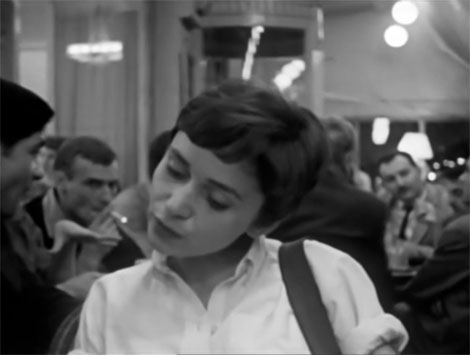Over the past several days, three pieces relating directly or indirectly to Eric Rohmer have appeared and, rather than include them in the next general roundup, I thought I’d give them a little breathing room in an entry of their own. The first is posted at one of the New York Review of Books blogs, The Gallery, and was written in the 90s by Nadja Tesich. Lucy McKeon helped her revise the piece during the few months before Tesich died in February 2014. The NYRB, which has embedded Rohmer’s Nadja à Paris (1964) between the paragraphs of her recollections, doesn’t mention that Tesich wrote four novels or where, specifically, she taught film. For a quick backgrounder, then, focusing on Tesich ‘s political activism, see Sara Flounders at Workers World.
When I attempt to describe my years in Paris, no one believes me, I can tell. It was too Hollywood-dream perfect. Here is Nadja coming out of the student restaurant, minding her own business, and who should appear next but Eric Rohmer who stops her (‘Why you of all people?’ they ask) and within minutes he wants to make a film about her life…. Years later, when I had left teaching in order to write full-time, I saw Nadja à Paris again at the Bleecker Street Cinema. I was afraid it would depress me the way old photos do, but instead I was touched by her. The girl, a child—me—was so thin and lonely looking, so sad in spite of the voice-over, which was all wisdom and lightness. You wanted to hug her, to console her about something.
At the AV Club, Mike D’Angelo writes about a scene (3’52”) from Love in the Afternoon (1972, originally released in the U.S. as Chloe in the Afternoon), an “atypical Rohmer film in certain respects (and a prototypical one in others).” In a conversation with a friend, Frédéric (Bernard Verley) “expresses his frustration that so many desirable women are walking around absorbed in their own lives, indifferent to his lust. The first several women we see look as if they might not even be actors—just pedestrians caught by Rohmer’s camera as they hurry past.”
Eventually, however, we come to half a dozen women who’ve definitely been planted. We can be confident of this since they collectively represent pretty much the entire roster of lead actresses in Rohmer’s previous films. “Indifferent” is Françoise Fabian, who played the title role in My Night at Maud’s; “Hurried” is Béatrice Romand, who’d been in Claire’s Knee and would star in several subsequent Rohmer pictures; “Hesitant” is Marie-Christine Barrault, also from My Night at Maud’s; “Busy” is Haydée Politoff, the female lead in La Collectionneuse; “Accompanied” is Laurence De Monaghan, the Claire in Claire’s Knee; “Alone” is Aurora Cornu, from Claire’s Knee as well. Somebody with more knowledge about Rohmer’s personal life might better be able to speculate about his decision to populate this sequence entirely with actresses he’d already cast in major roles, and whether it amounts to a confession about his own fantasies. Perhaps these were just people he could call to run over and perform on short notice. Still, their history with Rohmer does give the scene a suggestion of covert autobiography, which only helps.
Our third item comes via Movie City News. For Artinfo, Craig Hubert interviews Corina Copp, whose first book of poetry, The Green Ray, “reverberates inside the world” of Rohmer’s 1986 film and, “by proxy, Tacita Dean’s film meditation.” After discussing the origins of her title, by way of Rohmer, Dean, Jules Verne and Alain Robbe-Grillet, she notes that “both poetry and cinema are forms that can be paradoxically poisonous and healing, and they make us into a better kind of collective subject, but I don’t know. Their appeal to a solitude that lacks self-sufficiency is more compelling, actually.”
For news and tips throughout the day every day, follow @KeyframeDaily. Get Keyframe Daily in your inbox by signing in at fandor.com/daily.




